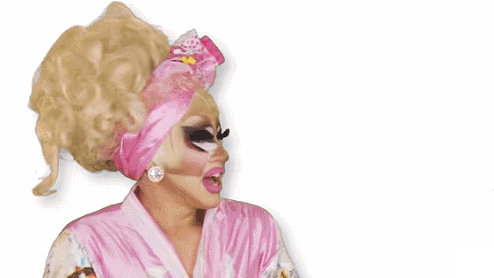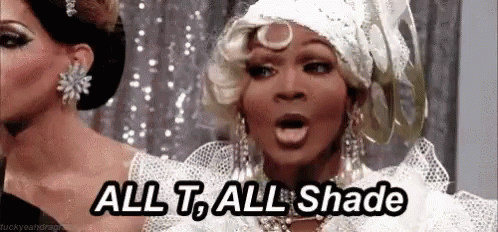A deep dive into common drag terms and why subcultures create their own vocabulary to establish a group identity.

Abstract: The language used and how people communicate is a huge part of culture. Cultures make their own languages and ‘slang terms’ to communicate, it is usually a way of a culture to set themselves apart and have a sense of community, drag queens are no exception. Drag queens have many different terms and ways of communication that dates way back to the very beginning of drag. Terms such as fish, shade, and tea were all created by drag queens and they have now found their way into being commonly used terms in pop-culture. Historically, drag queens have been marginalized therefore, it is interesting how their slang terms have become such a hit.
Before we go any further, let’s brush you up on your vocabulary! Use ‘Ru Paul’s Drag Race Dictionary’
Many marginalized groups create their own language terms and slang that the culture uses for various reasons. Nathaniel Simmons explains in Speaking Like a Queen in Ru Paul’s Drag Race, humans love using symbols as stimulation for meaning and reinforces cultural values. Drag Queen’s use of language symbolizes cultural ideologies such as, gender, sexuality, and race. It is no surprise to say that drag queens have historically been marginalized, even by the LGBTQ+ community. Simmons explains that groups often do make their own symbols to establish group identity, especially those that are marginalized like drag queens.

Speech Code Theory explains why groups such as drag queens develop their own speech codes and what that means to them. Just like creation of words, there is a unspoken code for how drag queens should speak. Simmon explains how the “code of sisterhood” is a major code involved in Ru Paul’s Drag Race and how the queens act and communicate. For example, they are told to uphold family values by “speaking like a queen”. Much of what “speaking like a queen” entails is confidence. Drag queens are fierce and unapologetically themselves, therefore, it makes sense that the expected communication is through confidence and building themselves and others up.
Click HERE to learn more about speech codes theory!

Style switching is extremely common in drag culture. In Stephen Mann’s Drag Queens’ Use of Language and the Performance of Blurred Gender and Racial Identities, he explores the linguistic choices of a drag queen during one of her shows. He focused on the style switching used within the show and how it relates to how drag artists wish themselves to be perceived. The drag queen used three different styles of language, White Women’s English (WWE), Gay Man’s English (GME), and African-American Vernacular Language (AAVE). Mann explains that drag queens use different style of language to negotiate aspects of their racial identity as well as gender identity. With the use of style-mixing, drag queens can use their linguistic choices to aide their blurring of gender and racial lines. For example, the term “honey” is often used by drag artists and can help aide a ‘southern belle’ character and amplify the illusion of being a southern woman.

Now for the fun, let’s talk about the terms! Drag queens have developed many terms that are used throughout the pageants and shows that have become common within the community. Kyle Turner did an excellent job in his article, Everything You Say That Comes from Drag, at explaining the origins of the terms we hear drag artists say all the time. Let’s start with “yaaasss”, one of my personal favorites and probably the most used term that the drag queens coined. The term “yas” is used as a form of excitement and approval, it takes the place of the typical “yes”. In the film Paris is Burning, the ball queen Dorian Corey first explained how drag queens used the term “serving [blank] realness”. This is now used in pop culture very often. It was first used as a way of saying that a look “passed”. In the drag community “passing” is a term that means that their drag is so on point that it would be noticed as drag out on the street.

The WIRED article written by Lexi Pandell discusses where most of the terms used in the drag community comes from and there is no surprise that a lot of the forms originated from black drag queens. Many of these terms have been snatched my popular culture throughout the years, the most memorable was “voguing”, Pandell explained how voguing was inspired from underground gay scene. Madonna even hired some of the dancers to teach her the dance and released her song Vogue without giving the drag community credit. Which the authors consider it an unforgivable theft. One would think that because of the origins of such terms they would not be regular in outside circles, but it appears cis young women are the most seduced by the terms.
Here is a short ‘HERStory’ lesson on Voguing

This is a very engaging post! I love the terms and definitions, your’e really making it fun to read your post.
Okay, I love everything about this post. You did such a good job making this interactive and educational. I like how you kept it real and talked about where terms we see and hear all the time came from and what they mean to the community. This could be a valuable resource to others who are looking to learn more about the language and terminology of the community! Nice job!
language is very important in general, but i also feel like the lingo in the LGBTQIA+ community is that much more important. It allows individuals in community to relate to each other, and find common ground. For me personally, i’m nervous around new people in group and social settings. But as soon a i heard a word or vocab i’m familiar with, i’m instantly comfortable and can let guard down a little around these people. i think this blog really will educate the masses of the vocab of my people, and prevent them from looking confused at next Dragshow